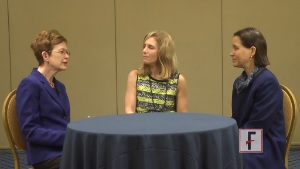User login
NATIONAL HARBOR, MD. – Menopause is often accompanied by complex changes in sexual health and function, and factors contributing to low libido and other sexual problems in postmenopausal women may include a combination of hormonal and psychological components, according to experts at the annual meeting of the North American Menopause Society (NAMS).
In this roundtable discussion, Dr. Jan L. Shifren of Harvard Medical School, Boston; NAMS executive director Dr. Margery Gass of Cleveland Clinic; and psychologist Sheryl A. Kingsberg, Ph.D., of the Case Western Reserve University, Cleveland, discuss the physiological, psychological, and relationship factors that affect sexual function and desire in postmenopausal women.
They also talk about treatments such as psychotherapy, low-dose estrogen therapy, and testosterone therapy that may be used to address postmenopausal sexual problems, and how to determine when psychological intervention alone is adequate, and when pharmacologic intervention may be needed.
But the most important thing, they stressed, was to ask women if they are having any changes in sexual health. This is not a topic most women are likely to bring up themselves.
Dr. Kingsberg disclosed relationships with Apricus Biosciences, Emotional Brain, Metagenics, Novo Nordisk, Palatin Technologies, Pfizer, Shionogi, Sprout Pharmaceuticals, Strategic Science and Technologies, and Teva Pharmaceuticals. Dr. Gass and Dr. Shifren did not report any relevant financial disclosures.
The video associated with this article is no longer available on this site. Please view all of our videos on the MDedge YouTube channel
NATIONAL HARBOR, MD. – Menopause is often accompanied by complex changes in sexual health and function, and factors contributing to low libido and other sexual problems in postmenopausal women may include a combination of hormonal and psychological components, according to experts at the annual meeting of the North American Menopause Society (NAMS).
In this roundtable discussion, Dr. Jan L. Shifren of Harvard Medical School, Boston; NAMS executive director Dr. Margery Gass of Cleveland Clinic; and psychologist Sheryl A. Kingsberg, Ph.D., of the Case Western Reserve University, Cleveland, discuss the physiological, psychological, and relationship factors that affect sexual function and desire in postmenopausal women.
They also talk about treatments such as psychotherapy, low-dose estrogen therapy, and testosterone therapy that may be used to address postmenopausal sexual problems, and how to determine when psychological intervention alone is adequate, and when pharmacologic intervention may be needed.
But the most important thing, they stressed, was to ask women if they are having any changes in sexual health. This is not a topic most women are likely to bring up themselves.
Dr. Kingsberg disclosed relationships with Apricus Biosciences, Emotional Brain, Metagenics, Novo Nordisk, Palatin Technologies, Pfizer, Shionogi, Sprout Pharmaceuticals, Strategic Science and Technologies, and Teva Pharmaceuticals. Dr. Gass and Dr. Shifren did not report any relevant financial disclosures.
The video associated with this article is no longer available on this site. Please view all of our videos on the MDedge YouTube channel
NATIONAL HARBOR, MD. – Menopause is often accompanied by complex changes in sexual health and function, and factors contributing to low libido and other sexual problems in postmenopausal women may include a combination of hormonal and psychological components, according to experts at the annual meeting of the North American Menopause Society (NAMS).
In this roundtable discussion, Dr. Jan L. Shifren of Harvard Medical School, Boston; NAMS executive director Dr. Margery Gass of Cleveland Clinic; and psychologist Sheryl A. Kingsberg, Ph.D., of the Case Western Reserve University, Cleveland, discuss the physiological, psychological, and relationship factors that affect sexual function and desire in postmenopausal women.
They also talk about treatments such as psychotherapy, low-dose estrogen therapy, and testosterone therapy that may be used to address postmenopausal sexual problems, and how to determine when psychological intervention alone is adequate, and when pharmacologic intervention may be needed.
But the most important thing, they stressed, was to ask women if they are having any changes in sexual health. This is not a topic most women are likely to bring up themselves.
Dr. Kingsberg disclosed relationships with Apricus Biosciences, Emotional Brain, Metagenics, Novo Nordisk, Palatin Technologies, Pfizer, Shionogi, Sprout Pharmaceuticals, Strategic Science and Technologies, and Teva Pharmaceuticals. Dr. Gass and Dr. Shifren did not report any relevant financial disclosures.
The video associated with this article is no longer available on this site. Please view all of our videos on the MDedge YouTube channel
FROM THE NAMS ANNUAL MEETING
